Irezumi Blu-ray Movie
HomeIrezumi Blu-ray Movie 
Arrow | 1966 | 86 min | Not rated | Jun 22, 2021Price
List price:Amazon: $19.98 (Save 50%)
Third party: $19.98 (Save 50%)
Only 17 left in stock (more on the way).
Movie rating
7.4 | / 10 |
Blu-ray rating
| Users | 0.0 | |
| Reviewer | 4.0 | |
| Overall | 4.0 |
Overview
Irezumi (1966)
A beautiful and strong-headed young woman from a middle-class merchant family is abducted into geisha work and forcibly tattooed with the image of a fearsome spider. Hell-bent on avenging herself on every man who makes a play for her, she takes advantage of her situation to wreak bloody vengeance… Garish and perverse and gleefully proud of it, and striking in its linking of sexuality and violence, the film is also infused with wonderful black humour and a visual style and beauty that is astonishing.
Starring: Ayako Wakao, Akio Hasegawa, Gaku Yamamoto, Kei Satô, Fujio SugaDirector: Yasuzô Masumura
| Foreign | Uncertain |
| Drama | Uncertain |
Specifications
Video
Video codec: MPEG-4 AVC
Video resolution: 1080p
Aspect ratio: 2.38:1
Original aspect ratio: 2.35:1
Audio
Japanese: DTS-HD Master Audio Mono
Subtitles
English
Discs
Blu-ray Disc
Single disc (1 BD)
Playback
Region free
Review
Rating summary
| Movie | 4.0 | |
| Video | 5.0 | |
| Audio | 4.0 | |
| Extras | 3.0 | |
| Overall | 4.0 |
Irezumi Blu-ray Movie Review
Reviewed by Jeffrey Kauffman June 17, 2021Some enterprising sociologist might have a field day (and indeed might have already had a field day, though I didn't find any "Buzzfeed"- esque lists online) looking into Japan's kind of odd history with tattoos, and the perhaps linked fact that there is almost a whole subgenre of Japanese films dealing with women being "inked", often against their will. Just in my own review queue, there have been a number of efforts to feature women and tattoos, and three of them, Inferno of Torture, Shogun's Joy of Torture, and Blind Woman's Curse, were probably not so coincidentally the handiwork of the often provocative Teruo Ishii. While this film is instead by Yasuzô Masumura, who has been getting a number of releases put out by Arrow, it also features a hapless female having to submit to a perhaps obsessed tattoo artist. In what is described on the commentary track included on this disc as a supplement as a kind of visual euphemism for rape, a woman is indeed seen being first drugged (to make her compliant) and then "adorned" with an expansive tattoo on her back which is ultimately revealed to be a huge spider as Irezumi (a term which means tattoo) opens.
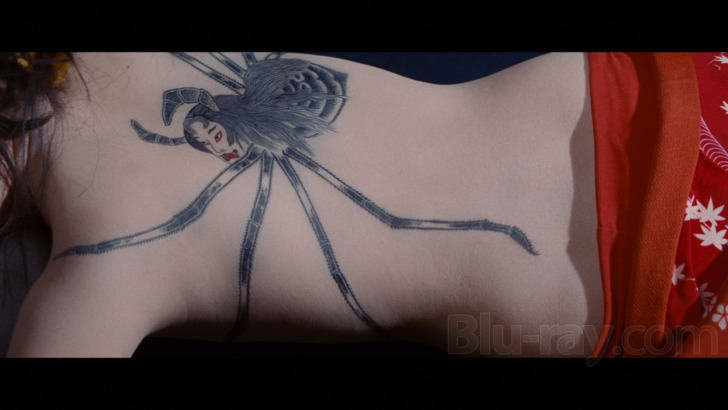
As some of the supplements get into, Irezumi is a bit of a disjunctive viewing experience since different timeframes are explored without any clear labeling, and so a somewhat refracted storyline needs to be "reassembled" by the audience as things unfold. The initial tattooing vignette, which plays out both underneath and as interstitials between the credits, introduces Otsuya (Ayako Wakao), an apparently helpless woman who is the obsessive object of tattoo artist Seikichi (Gaku Yamamoto), who quickly goes about inscribing Otsuya's back with a mutant spider with an almost human-like face. Just one of the film's many surprises is a subsequent reveal that while Otsuya may indeed be helpless in that particular situation, once the entirety of her story is told, she's actually a rather resilient, maybe even scheming, sort.
What ensues, though not necessarily strictly chronologically, is a tale of multiple betrayals, the first of which involves Otsuya and the man she hopes to marry, Shinsuke (Akio Hasegawa). It turns out that Otsuya is from a rather well to do family, and Shinsuke is one of her father's employees, which brings a certain "class consciousness" into their proposed nuptials. Gonji (Fujio Suga), a business associate of Otsuya's father, offers to help the pair, but instead double crosses them, with the upshot being Otsuya is sold into geisha slavery (hence the tattoo), and Shinsuke is ostensibly killed. Suffice it to say, there are more twists and turns as an apparently submissive Otsuya may in fact simply be making lemonade out of lemons, so to speak, with death and destruction following almost inexorably in her wake.
Commentator David Desser gets into a perceived kabuki aspect to some of the proceedings here, with actual presentational aspects seemingly willfully evoking that style. That might imply a certain artistic "remove" from honest human emotion, but while there is definitely a theatrical air to things, there's also a rather visceral naturalism that makes Otsuya's travails disturbingly compelling. If there's a slightly florid aspect at times, it's interesting to note that while the film's credits tout a supposed source "novel" by Jun'ichirô Tanizaki, some of the supplements get into the fact that Tanizaki's work was really a short story, if even that, so that Kaneto Shindô's screenplay is actually at least as much of an original piece of work as it is any kind of an adaptation.
As Tony Rayns alludes to in his introduction to the film included on the disc as a bonus item, there's a slightly supernatural air to the proceedings given the fact that it's at least implied that the spider tattoo inked into Otsuya's back has some kind of demonic power that "infects" her, causing her to matriculate to the "dark side", but that interpretation really isn't required to understand her choices. The film is in its own weird way an ode to female empowerment, even if it turns out to be a pyrrhic victory.
Irezumi Blu-ray Movie, Video Quality 
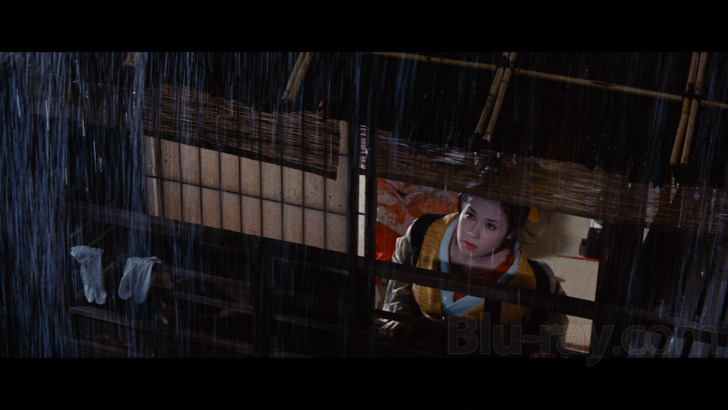
Irezumi is presented on Blu-ray courtesy of Arrow Video with an AVC encoded 1080p transfer in 2.38:1. Arrow's insert booklet contains the following information on the transfer:
Irezumi is presented in its original aspect ratio of 2.35:1 with mono sound. The film was restored in 4K from the original 35mm negative by Kadokawa, with additional work by Arrow Films and R3Store Studios, London.This is a really ravishing looking transfer that offers abundant detail levels and an often gorgeously suffused palette. Reds and purples are especially evocative throughout the film and pop really well, and even some rather dimly lit material has surprising amounts of shadow detail. I was especially struck by the clear delineation between things like dark blues and blacks in some of these relatively unlit sequences. Fine detail on the many intricately patterned fabrics is also notable. Grain resolves nicely throughout, and there's really no damage of any import that I noticed.
Irezumi Blu-ray Movie, Audio Quality 
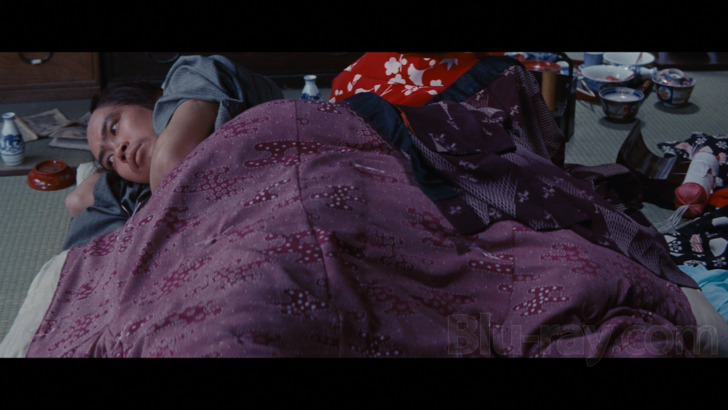
Irezumi features a DTS-HD Master Audio Mono track in the original Japanese. While there are occasional ambient environmental effects and an at times slightly anachronistic score by Hikaru Hayashi, there isn't a ton to the sound design. Dialogue is rendered cleanly and clearly throughout, and I noticed no problems with regard to any damage, dropouts or distortion. Optional English subtitles are available.
Irezumi Blu-ray Movie, Special Features and Extras 
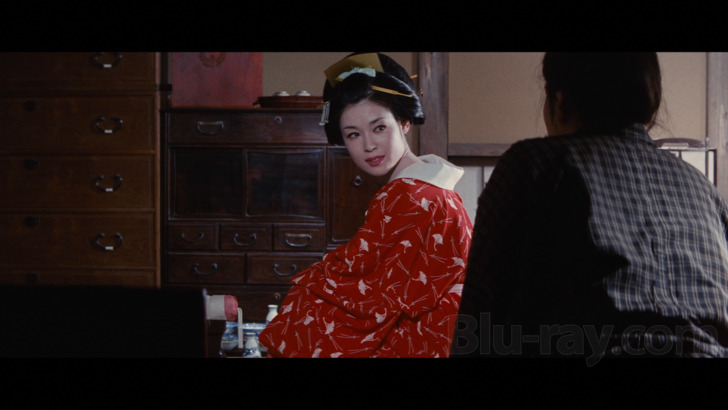
- Audio Commentary by David Desser
- Introduction by Tony Rayns (HD; 9:50) is another interesting overview by Rayns, who contributed a similar effort to Arrow's recent release of Masumura's Giants and Toys.
- Out of the Darkness (HD; 13:04) is an interesting analysis by Daisuke Miyao of the film's cinematography by Kazuo Miyagawa, who famously also shot Rashomon and Ugetsu. This is a bit hard to understand at times, due to both Miyao's heavy accent and what sounds like a literally "phoned in" audio track.
- Original Theatrical Trailer (HD; 2:17)
- Image Gallery (HD) is authored for manual advance only.
Irezumi Blu-ray Movie, Overall Score and Recommendation 
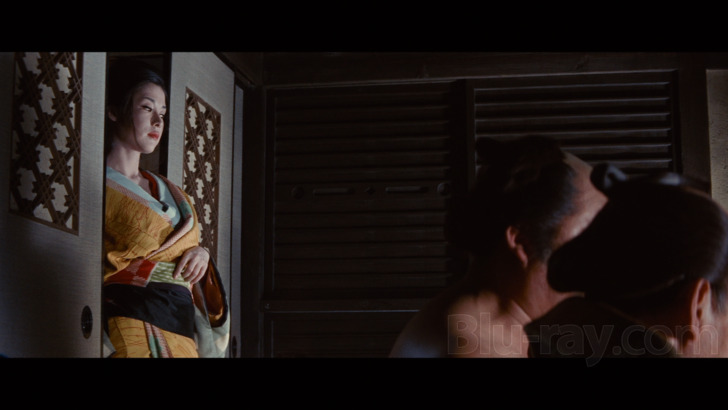
There's a kind of relentless tragic trajectory to the story in Irezumi, despite some narrative flourishes that kind of rely on different kimonos to establish timeframes the way some other films might use something like hairstyles. Those who have seen any if the Teruo Ishii films linked to above, or any other films featuring women and tattoos (there's even another film called Irezumi from 1982) will find this a really interest companion and/or contrasting piece. Arrow is offering a disc with solid technical merits and its usual supply of well done supplemental material. Recommended.
Similar titles
Similar titles you might also like

24 Frames
2017

A Touch of Sin
天注定 / Tian zhu ding
2013

The Painted Bird
Nabarvené ptáce / Slipcover in Original Pressing
2019

Les Dames du Bois de Boulogne
1945

The Salesman
Forushande
2016

36th Precinct
36 quai des Orfèvres
2004

Baise-moi
Rape Me
2000

Nathalie...
2003

Birds of Passage
Pájaros de verano
2018

An Actor's Revenge
雪之丞変化 / Yukinojô henge
1963

Capital
Le capital
2012

Female Prisoner Scorpion: Beast Stable
1973

Tchao pantin
So Long, Stooge | Limited Edition
1983

The Disenchanted
La désenchantée
1990

Diary of a Lost Girl
Tagebuch einer Verlorenen
1929

Elles
2011

Murmur of the Heart
Le souffle au coeur
1971

In a Better World
Hævnen
2010

Mamma Roma
1962

The Merchant of Four Seasons
Händler der vier Jahreszeiten
1971
